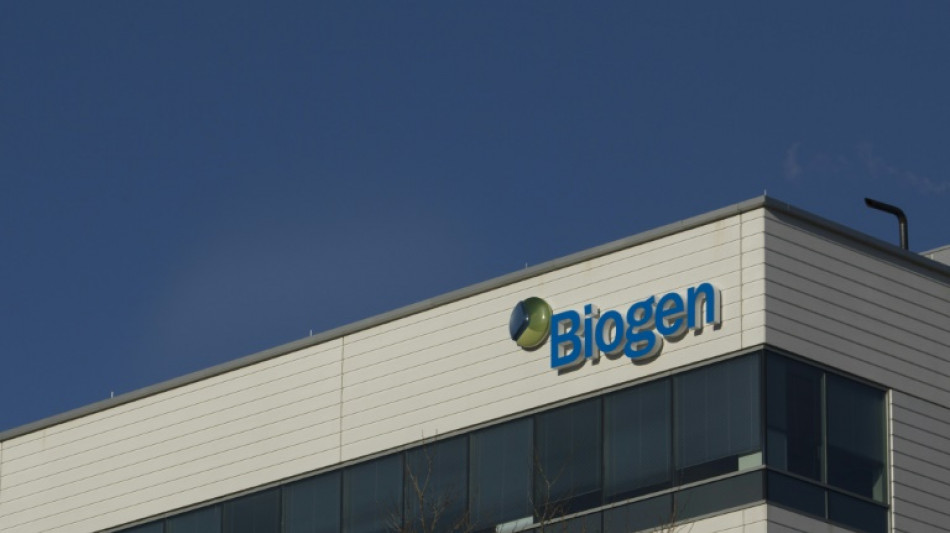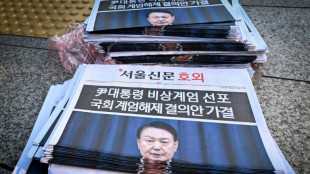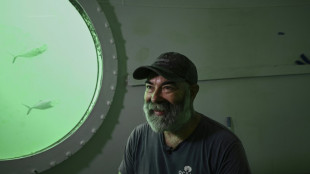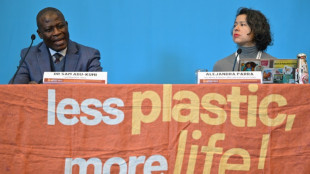
-
 Dutch F1 Grand Prix to end in 2026: organisers
Dutch F1 Grand Prix to end in 2026: organisers
-
Gunman held after failed attack on Sikh leader in India

-
 Pakistan recall Babar Azam for South Africa tour, Sajid Khan out
Pakistan recall Babar Azam for South Africa tour, Sajid Khan out
-
Seoul stocks sink amid S. Korea drama as Asian markets mixed

-
 French appeals court to rule in Polanski defamation case
French appeals court to rule in Polanski defamation case
-
Death toll rises to 29 in southern Thailand floods

-
 South Korean opposition move to impeach president after martial law bid
South Korean opposition move to impeach president after martial law bid
-
Trump's vows of quick peace fall flat on Ukraine frontlines

-
 Soldiers vs office chairs: South Korea's martial law standoff
Soldiers vs office chairs: South Korea's martial law standoff
-
Japan's Premier League pioneer Inamoto retires aged 45

-
 Second major Myanmar rebel group calls for talks with junta
Second major Myanmar rebel group calls for talks with junta
-
FIFA to reveal Club World Cup draw amid apathy, legal threats

-
 Taiwan's Lai arrives in Tuvalu to shore up Pacific allies
Taiwan's Lai arrives in Tuvalu to shore up Pacific allies
-
South Korean president pressed to step down over martial law bid

-
 Huge Vietnam fraud case raises questions over banking system
Huge Vietnam fraud case raises questions over banking system
-
Ghana thrusts economy into limelight in tight race for president

-
 Philippines says China Coast Guard fired water cannon, 'sideswiped' govt vessel
Philippines says China Coast Guard fired water cannon, 'sideswiped' govt vessel
-
Vietnam pushes electric motorbikes as pollution becomes 'unbearable'

-
 Seoul stocks sink amid S. Korea drama as Asian markets struggle
Seoul stocks sink amid S. Korea drama as Asian markets struggle
-
Hong Kong mega development plan to devour villages, wetlands

-
 French government risks falling in no-confidence vote
French government risks falling in no-confidence vote
-
Stokes fit as England name unchanged team for 2nd New Zealand Test

-
 Djokovic to begin bid for 25th Grand Slam crown in Brisbane
Djokovic to begin bid for 25th Grand Slam crown in Brisbane
-
Life has 'disappeared': Mexican city reeling from cartel infighting

-
 IXOPAY and Aperia Compliance Merge to Extend Advanced Payment Data Security to Merchant Acquirers and Merchants of All Sizes, Worldwide
IXOPAY and Aperia Compliance Merge to Extend Advanced Payment Data Security to Merchant Acquirers and Merchants of All Sizes, Worldwide
-
S.Korea political upheaval shows global democracy's fragility - and resilience

-
 Van Nistelrooy off to winning start at Leicester, Palace beat Ipswich
Van Nistelrooy off to winning start at Leicester, Palace beat Ipswich
-
Global stocks end mostly up with DAX crossing 20,000 for 1st time

-
 Georgia's ombudsman accuses police of torturing pro-EU protesters
Georgia's ombudsman accuses police of torturing pro-EU protesters
-
Norway, Sweden win big to reach Women's Euro 2025

-
 Partner of ex-Abercrombie & Fitch CEO pleads not guilty to sex trafficking
Partner of ex-Abercrombie & Fitch CEO pleads not guilty to sex trafficking
-
Leverkusen eliminate Bayern from German Cup after Neuer sees first red

-
 Syria rebels 'at gates' of central city Hama
Syria rebels 'at gates' of central city Hama
-
Amazon launches AI models to challenge rivals

-
 Bolivian ex-president, who fled to US, sentenced to six years prison
Bolivian ex-president, who fled to US, sentenced to six years prison
-
Bayern's Neuer sent off for first time in 866-game career

-
 Namibia elects its first woman president
Namibia elects its first woman president
-
Scottish artist Jasleen Kaur wins 2024 Turner Prize

-
 Barca hit five as they return to winning ways at Mallorca
Barca hit five as they return to winning ways at Mallorca
-
S. Korea president says will lift martial law

-
 Olympic champion Evenepoel breaks hand, shoulder in postal van collision
Olympic champion Evenepoel breaks hand, shoulder in postal van collision
-
Syria rebels advance on central city

-
 S. Korea's President Yoon, embattled conservative
S. Korea's President Yoon, embattled conservative
-
UK museum in talks with Greece over 'long-term' deal for Parthenon Marbles

-
 What we know about South Korea's martial law
What we know about South Korea's martial law
-
Biden announces $1 bn for Africa during maiden trip

-
 Retailers point to solid US sales over holiday weekend
Retailers point to solid US sales over holiday weekend
-
Europe-loving Blinken on last trip to NATO before Trump handover

-
 Seeking a new way of life under the sea - and a world record
Seeking a new way of life under the sea - and a world record
-
Defying headwinds, German stocks hit milestone


European watchdog partially approves new Alzheimer's drug
Europe's medicines watchdog on Thursday partially approved a marketing request for a long-awaited new treatment for Alzheimer's disease, reversing an earlier decision not to give it the green light.
"After re-examining its initial opinion, the EMA... has recommended granting marketing authorisation to Leqembi (lecanemab) for treating mild cognitive impairment or mild dementia due to Alzheimer's disease," the European Medicines Agency said, adding treatment would only apply to a certain group of patients.
Leqembi, developed by US multinational Biogen and Japanese-based Eisai, is the brand name of an active substance called lecanemab that is used to treat adults with mild memory and cognitive problems resulting from the early stages of the common type of dementia.
The EMA in July rejected a marketing request, saying the side effects, including potential brain bleeding, outweighed the benefits.
The EMA now endorsed the treatment, but only for patients with a lower risk of potential brain bleeding -- those who had "only one copy or no copy of ApoE4", a type of gene know as an important risk factor for Alzheimer's.
Such patients are less likely to experience certain serious health problems than people with two copies of the gene, the Amsterdam-based EMA said.
The health problems in question, known as amyloid-related imaging abnormalities (ARIA), include fluid on the brain and brain bleeding.
"The benefits of Leqembi outweigh the risks in patients with mild cognitive impairment or mild dementia due to Alzheimer's disease with one or no copy of ApoE4."
This was "provided that risk minimisation measures are in place to reduce the risk of severe and symptomatic ARIA and monitor its consequences in the long term," it stressed.
Bringing down the risks included providing Leqembi through a "controlled access programme to ensure that the medicine is only used in the recommended patient population" and through MRI scans before and during treatment.
The Amsterdam-based EMA's approval will now be sent to the European Commission for a final decision to roll it out on the continent.
Pricing and reimbursement will be left up to member states, the EMA said.
Lecanemab has been hailed by Alzheimer's researchers and charities for being the first approved treatment which tackles the early stages of the disease, rather than managing the symptoms.
It works by using antibodies which bind to and clear the proteins that normally build up in the brains of people with Alzheimer's, the most common type of dementia.
The treatment has been shown to decrease cognitive decline by a quarter in people in the early stages of the disease.
Britiain's medicines regulator approved lecanemab in August, making it the country's first such licensed treatment.
Leqembi, together with another Alzheimer's drug called Aduhelm, received approval from the US Food and Drug Administration early last year.
I.Meyer--BTB




